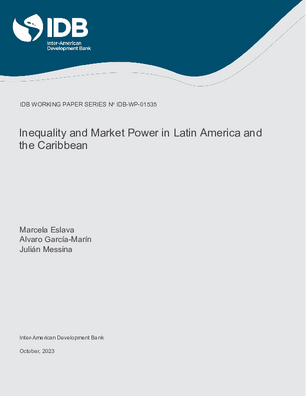Inequality and Market Power in Latin America and the Caribbean
Date
Oct 2023
Firms market power may exacerbate income inequality. We investigate this relationship among firms in Latin America and the Caribbean (LAC), where this phenomenon remains understudied. We use firm-level data for formal firms in 16 countries in LAC and 31 peer economies with similar levels of GDP per capita but much less inequality. We study 1) The extent and dispersion of market power among LACs firms compared to firms in peer economies; 2) the relationship between market power and the labor share of revenue at the firm level; and 3) the implications of that relationship for the aggregate labor share of income, which depends on the joint distribution (across firms) of market power, the labor share, and firms size. Markups (markdowns) measure product (labor) market power. Our results indicate that the average markup in the region is 20 percent above marginal costs, while average wages are 46 percent below the marginal revenue product of labor. The negative relationship at the firm level between the labor share and combined market power is driven by labor rather than product market power. Finally, we show that labor market power is more pronounced among larger firms, magnifying the effect of market power on the aggregate labor share and income distribution. However, there is no indication that market power is more acute or dispersed in LAC than in its peers, nor does it appear to induce more inequality than in those countries.




